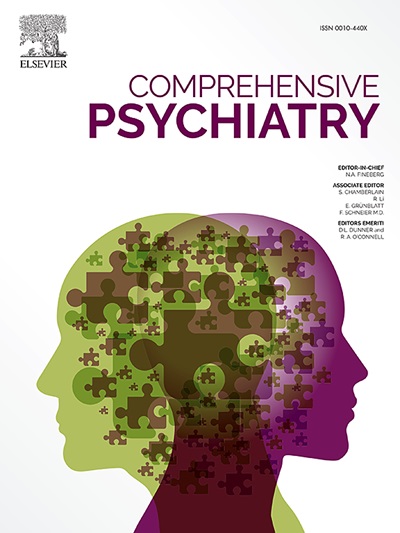Pharmacological management of gambling disorder: A systematic review and network meta-analysis
IF 4.2
2区 医学
Q1 PSYCHIATRY
引用次数: 0
Abstract
Background
Clinical guidelines remain unclear on which medications for gambling disorder are to be preferred in terms of efficacy and tolerability. We aimed to compare pharmacological treatments for gambling disorder in terms of efficacy and tolerability, using network meta-analysis (NMA).
Methods
Based on our pre-registered protocol [CRD42022329520], a structured search was conducted across broad range of databases, for double-blind randomized controlled trials (RCTs) of medications for gambling disorder. Data were independently extracted by two researchers. We used standardized mean differences (SMD) using Hedges' g to measure the efficacy outcomes, and for the effect for tolerability we used dropout rate due to medication side effects, expressed as odds ratio (OR). Confidence in the network estimates was assessed using the CINeMA framework. We followed the PRISMA-NMA guidelines for this work. Outcomes were gambling symptom severity and quality of life (for efficacy), and tolerability.
Findings
We included 22 RCTs in the systematic review and 16 RCTs (n = 977 participants) in the NMA. Compared with placebo, moderate confidence evidence indicated that nalmefene [Standardized Mean Difference (SMD): −0.86; 95 % confidence interval (CI: −1.32,-0.41)] reduced gambling severity, followed by naltrexone (SMD: -0.42; 95 %CI: (−0.85,0.01)). Naltrexone (SMD: -0.50; 95 %CI: (−0.85,-0.14)) and nalmefene (SMD: -0.36; 95 %CI: (−0.72,-0.01) were also more beneficial than placebo in terms of quality of life. Olanzapine and topiramate were not more efficacious than placebo. Nalmefene [Odds Ratio (OR): 7.55; 95 %CI: (2.24–25.41)] and naltrexone (OR: 7.82; 95 %CI: (1.26–48.70)) had significantly higher dropout due to side effects (lower tolerability) compared with placebo.
Interpretation
Based on NMA, nalmefene and naltrexone currently have the most supportive evidence for the pharmacological treatment of gambling disorder. Further clinical trials of novel compounds, and analysis of individual participant data are needed, to strengthen the evidence base, and help tailor treatments at the individual patient level.
赌博障碍的药物治疗:系统综述和网络荟萃分析。
背景:临床指南对治疗赌博障碍的药物的疗效和耐受性仍不明确。我们的目的是通过网络荟萃分析(NMA)比较药物治疗赌博障碍的疗效和耐受性:根据我们预先登记的方案[CRD42022329520],我们在广泛的数据库中进行了结构化检索,以寻找治疗赌博障碍药物的双盲随机对照试验(RCT)。数据由两名研究人员独立提取。我们使用Hedges'g标准化平均差(SMD)来衡量疗效结果,而对于耐受性的影响,我们使用因药物副作用而导致的辍学率(以几率比(OR)表示)。采用 CINeMA 框架评估了网络估计值的可信度。我们在这项工作中遵循了 PRISMA-NMA 指南。研究结果包括赌博症状严重程度、生活质量(疗效)和耐受性:我们在系统综述中纳入了 22 项 RCT,在 NMA 中纳入了 16 项 RCT(n = 977 名参与者)。与安慰剂相比,中等置信度的证据表明,纳美芬[标准化平均差(SMD):-0.86;95 %置信区间(CI):-1.32,-0.41]]可降低赌博的严重程度,其次是纳曲酮(SMD:-0.42;95 %CI:(-0.85,0.01))。就生活质量而言,纳曲酮(SMD:-0.50;95 %CI:(-0.85,-0.14))和纳美芬(SMD:-0.36;95 %CI:(-0.72,-0.01))也比安慰剂更有益。奥氮平和托吡酯的疗效并不优于安慰剂。与安慰剂相比,纳美芬[Odds Ratio (OR):7.55;95 %CI:(2.24-25.41)]和纳曲酮(OR:7.82;95 %CI:(1.26-48.70))因副作用(耐受性较低)而退出治疗的比例明显更高:根据NMA,纳美芬和纳曲酮目前在药物治疗赌博障碍方面拥有最有力的支持性证据。还需要对新型化合物进行进一步的临床试验,并对个体参与者的数据进行分析,以加强证据基础,并帮助根据患者的具体情况量身定制治疗方案。
本文章由计算机程序翻译,如有差异,请以英文原文为准。
求助全文
约1分钟内获得全文
求助全文
来源期刊

Comprehensive psychiatry
医学-精神病学
CiteScore
12.50
自引率
1.40%
发文量
64
审稿时长
29 days
期刊介绍:
"Comprehensive Psychiatry" is an open access, peer-reviewed journal dedicated to the field of psychiatry and mental health. Its primary mission is to share the latest advancements in knowledge to enhance patient care and deepen the understanding of mental illnesses. The journal is supported by a diverse team of international editors and peer reviewers, ensuring the publication of high-quality research with a strong focus on clinical relevance and the implications for psychopathology.
"Comprehensive Psychiatry" encourages authors to present their research in an accessible manner, facilitating engagement with clinicians, policymakers, and the broader public. By embracing an open access policy, the journal aims to maximize the global impact of its content, making it readily available to a wide audience and fostering scientific collaboration and public awareness beyond the traditional academic community. This approach is designed to promote a more inclusive and informed dialogue on mental health, contributing to the overall progress in the field.
 求助内容:
求助内容: 应助结果提醒方式:
应助结果提醒方式:


